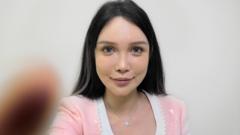Abby Wu’s extraordinary journey highlights the intense pressures of beauty standards in China, as the number of cosmetic procedures skyrockets amidst a backdrop of social media-fueled ideals, unregulated practices, and troubling trends.
'Beauty or Burden? Inside China's Expanding Cosmetic Surgery Phenomenon'

'Beauty or Burden? Inside China's Expanding Cosmetic Surgery Phenomenon'
A deep dive into China's cosmetic surgery culture, revealing the joys and risks of the booming industry.
Abby Wu was only 14 when she underwent her first cosmetic surgery procedure, a lipo sculpture suggested by her mother in response to weight gain after hormone treatment. Now at 35, Abby has had over 100 surgeries, costing her around half a million dollars and earning her the title of one of China's leading cosmetic surgery influencers. This journey, filled with both triumphs and physical repercussions, underscores the country's evolving relationship with beauty.
As plastic surgery grows more mainstream in China, driven significantly by young women and a surge in disposable income, it is accompanied by shifting beauty standards. While earlier trends emphasized Western aesthetics, the advancement of social media has introduced a mix of cultural references, including anime and K-Pop, leading to increasingly unrealistic ideals. Procedures like jawline sculpting, eyelid surgeries, and even Botox injected behind the ears have become common, presenting a transformed notion of beauty that can lead to distressingly unnatural outcomes.
While Abby Wu actively promotes her experiences through her social media platforms, she highlights a haunting aspect of the beauty culture: the increasing prevalence of unlicensed clinics. Reports suggest that many cosmetic surgery facilities are operating illegally or without proper accreditation, leading numerous individuals to face botched operations, causing extensive physical and psychological damage.
Yue Yue, another victim of a failed cosmetic procedure, shares her struggle with severe complications following collagen injections from an unlicensed clinic. Facing challenges in her professional life, she shares, “I don’t want to become prettier anymore. If I could go back to how I looked before surgery, I’d be quite happy.” This sentiment is echoed by actress Gao Liu, whose botched nose operation led to a series of failed surgeries, leaving lasting scars on both her face and career.
The reality for many in this booming industry reveals darker consequences. Young women seeking jobs are sometimes manipulated into undergoing expensive surgeries under false pretenses, plunging them into debt. Da Lan recounts her experience of receiving a job offer that turned into a coerced surgery, leaving her feeling trapped and disillusioned.
Despite the dangers and prevalence of scams in the field, cosmetic surgery remains attractive to many. Abby, who continues to seek further enhancements, epitomizes the ongoing pursuit of beauty in a culture deeply influenced by both traditional norms and modern pressures. Yet, as she reflects on her past surgeries, there remains an acknowledgment that the quest for beauty carries a heavy burden, often obscured by a thirst for approval in both social and employment contexts.
As China becomes the epicenter of a beauty revolution, it raises pressing questions about safety, ethics, and the profound cost of conforming to ever-changing standards of attractiveness in the modern era.


















